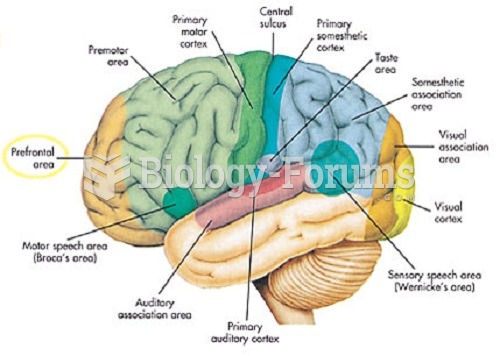This topic contains a solution. Click here to go to the answer
|
|
|
Did you know?
Approximately 500,000 babies are born each year in the United States to teenage mothers.
Did you know?
If all the neurons in the human body were lined up, they would stretch more than 600 miles.
Did you know?
Illicit drug use costs the United States approximately $181 billion every year.
Did you know?
People with alcoholism are at a much greater risk of malnutrition than are other people and usually exhibit low levels of most vitamins (especially folic acid). This is because alcohol often takes the place of 50% of their daily intake of calories, with little nutritional value contained in it.
Did you know?
The ratio of hydrogen atoms to oxygen in water (H2O) is 2:1.







